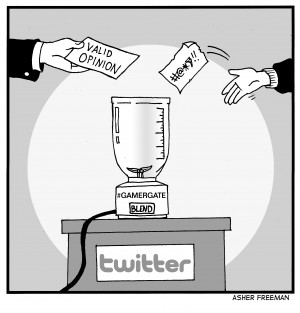 GamerGate just might be the biggest current event that many Americans never heard of. Some may not see the connection between videogames, ethical journalism and misogyny, or even why they should care about videogame news. However, GamerGate is huge social phenomenon worth paying attention to, and condemning, even for those with no interest in videogames.
GamerGate just might be the biggest current event that many Americans never heard of. Some may not see the connection between videogames, ethical journalism and misogyny, or even why they should care about videogame news. However, GamerGate is huge social phenomenon worth paying attention to, and condemning, even for those with no interest in videogames.
So what is GamerGate? Good question. About the only thing gamergaters and their opponents agree on is that GamerGate is an online movement, mostly on Twitter, that seeks changes in the videogame industry. However, exactly what gamergaters want changed is still up for debate.
Gamergaters say their movement is about demanding ethical journalism from reporters who cover the videogame industry. The movement claims that some journalists have relationships with the game developers they cover, creating a conflict of interest, and write favorable reviews of games to help their friends. Opponents of GamerGate say the call for ethical journalism is a charade and, in reality, it is a sexist movement that seeks to oust female videogame developers, journalists and even players.
The jump from ethical journalism to sexism isn’t as far as it may seem. An entire generation has now grown up with videogames and continued to play them in their adulthood, creating a sort of gamer culture. For a long time videogames were mainly created by, targeted toward and purchased by males. However, women started to emerge in the industry as videogames because a more popular and mainstream form of art and entertainment.
As the industry became more diverse, questions arose about topics such as sexism, homophobia and violence in certain games. Independent game developers also emerged, making it easier for women to enter the industry, and some developers started creating games that they considered to be art more than entertainment. These artsy games often had stories that revolved around civil rights, mental illness, and liberal social agendas.
Many gamers grew up with, and became accustomed to, a certain type of game and didn’t welcome the change. Ultimately, when an opportunity came to push back on the forces of change, many of them acted.
Most accounts of the origin of GamerGate say it started with the harassment of Zoe Quinn, a female independent game developer. Quinn developed “Depression Quest,” a game that is supposed to help people navigate their way through depression. Quinn’s game was released in August 2014 and was very unpopular with many gamers, but received acclaim from some industry critics for being socially progressive. After the release, Quinn’s ex boyfriend spread multiple defaming rumors about her online. One of the rumors alleged that Quinn had an affair with a videogame industry reporter, and that relationship helped her get positive reviews for “Depression Quest.”
The validity of Quinn’s former boyfriend’s claims are questionable, but they were received as fact online. Ultimately, Quinn received threats of rape, murder, and harm to her family. There are many other stories like Quinn’s. Female videogame industry workers continue to be harassed every day. In multiple cases, the women were forced to leave their homes after threats or when their address was posted on public online forums.
There is no doubt that some gamergaters exist who truly want better videogame journalism, and some who are on a sexist crusade. The schism between gamergaters and their opponents is about which camp is in the majority, and which is a fringe. Gamergaters claim that those who are harassing and threatening women are part of a small-radical fringe making the rest of them look bad. While opponents of GamerGate claim the opposite.
So who is right? There are thousands of tweets from each side stating their case, and Newsweek decided to study them. Newsweek asked the social media analytics company BrandWatch to study harassing tweets containing #GamerGate and compile data about who they were directed toward. Newsweek hypothesized that if GamerGate was truly about ethical journalism, most negative tweets with #GamerGate would be directed toward videogame journalists, regardless of sex. However, that is not what they found. According to the data, female game developers have received significantly more harassment from tweets containing #GamerGate than males journalists who cover the videogame industry. The BrandWatch study also showed that Leigh Alexander, a female game and tech culture writer, received 13,296 GamerGate related tweets, even though she hasn’t been accused of any unethical journalism. Newsweek concluded that GamerGate is truly about sexism and harassment.
Although the GamerGate story hasn’t stimulated much public interest outside a few select circles, it should. Millions of Americans play videogames every day and the gamer community continues to grow. Problems within this circle are microcosms of larger issues in American society. Large groups of young men who unprovokingly threaten women, for any reason, should cause public outrage. But harassing women for simply wanting an equal opportunity to develop videogames or write about the industry is significantly more disturbing.
Obviously, there are many good people who play videogames that would never support this appalling behavior. Gamers who really feel there are unethical practices in videogame journalism should remove themselves from this movement immediately and express their grievances, respectfully, through formal channels with the journalist’s employers. There is a right and wrong way to do things, and trolling the Internet with complaints that get mixed in with vulgar and offensive comments is certainly not the right way to go about anything.






